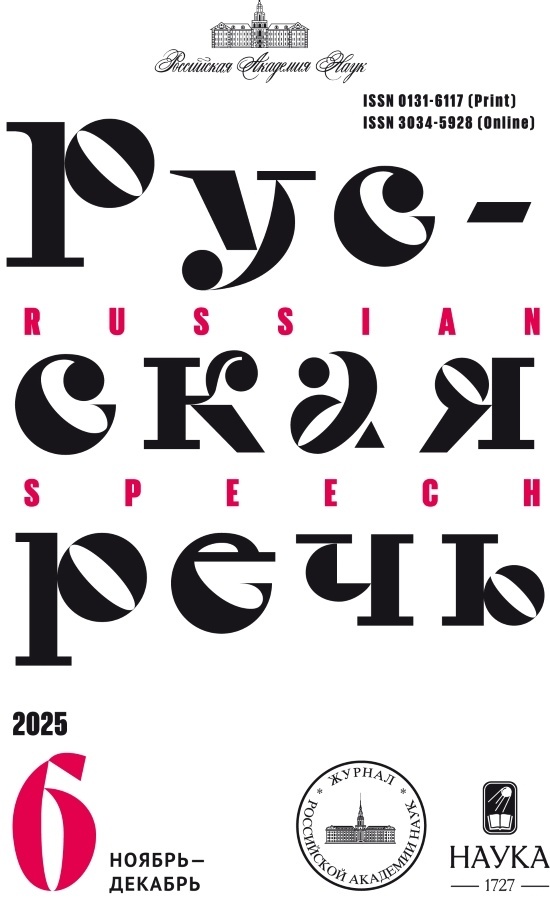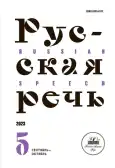Concept “Document” in the Speech of Peasants (Based on the Materials of the Tomsk Dialect Corpus)
- Authors: Zemicheva S.S.1
-
Affiliations:
- Tomsk State University
- Issue: No 5 (2023)
- Pages: 69-80
- Section: Articles
- URL: https://rjsvd.com/0131-6117/article/view/652350
- DOI: https://doi.org/10.31857/S013161170028367-2
- ID: 652350
Abstract
The article is based on the oral speech of Russian peasants, recorded on the territory along the middle course of the river Ob (Tomsk and Kemerovo regions) for 75 years. The main source of the study is a thematically annotated dialect corpus, which includes 2 million tokens. In the course of study I have analysed 128 text fragments related to the topic “Documents”. Based on the analysis of dictionary definitions, I identified the components of the “Document” concept: ‘something related to public or service activities’; ‘something new’; ‘enforces rights’; ‘can serve as proof of something’. In the figurative layer of the concept, manifested in the inner form of words, its core features are fixed: materiality, connection with the spheres of education, state, and interpersonal relations. At the same time, already at this level, there is a connection with feelings and evaluation. It has been established that the central cognitive feature of the “Document” concept is its novelty, which is associated with such associative features as ‘a document is something incomprehensible’, ‘a document can serve as a means of deception’. The last of them probably reflects the specifics of folk speech culture. The value layer of the concept, manifested in the discourse of rural residents, combines positive (a document as a recognition of a person's merits, a source of pride, a museum exhibit) and negative (a document as something useless) evaluative components. It has been established that the semantic components ‘document fixes the true state of affairs’, ‘document fixes rights’ in dialect discourse are updated infrequently, although they occupy a central position in the dictionary representation of the concept.
References
- Вендина Т. И. Антропология диалектного слова. М.–СПб.: Нестор-История, 2020. 684 с.
- Гольдин В. Е. Теоретические проблемы коммуникативной диалектологии: дис. … д-ра филол. наук в виде науч. докл. Саратов, 1997. 52 с.
- Гольдин В. Е., Крючкова О. Ю. Русская диалектология. Коммуникативный, когнитивный и лингвокультурный аспекты. Саратов: ИЦ «Наука», 2010. 120 с.
- Гынгазова Л. Г. Ключевые концепты традиционной народной культуры в речевых практиках сибирской крестьянки // Словесная культура Сибири в общероссийском и европейском контекстах (XIX – начало XX в.) / Под общ. ред. И. А. Айзиковой. Томск: Издательский Дом Том. гос. ун-та, 2019. С. 55–95.
- Демешкина Т. А. Векторы развития современной русской диалектологии // Актуальные проблемы обучения русскому языку: материалы международной научной конференции (Брно, Чехия, 05–07 мая 2014 г.). Брно, 2014. С. 268–278.
- Иванцова Е. В. Вариативность реализации ключевого концепта ХЛЕБ в разных типах русской речевой культуры // Актуальные проблемы и перспективы русистики: материалы по итогам Международной конференции русистов в Барселонском университете, 20–22 июня 2018. Barcelona: Trialba Ediciones, 2018. С. 1172–1181.
- Карасик В. И. Языковой круг: личность, концепты, дискурс. Волгоград: Перемена, 2002. 477 с.
- Карасик В. И. Языковые ключи. М.: Гнозис, 2009. 406 с.
- Слаутина М. В. Лексическая категория «Документ» в когнитивном аспекте // Вестник Волгоградского государственного университета. Серия 2: Языкознание. 2016. Т. 15. № 1. С. 82–86.
- Тубалова И. В. Полифонический текст в устных личностно-ориентированных дискурсах; науч. ред. З. И. Резанова. Томск: Изд-во Том. ун-та, 2016. 370 с.
- Szmrecsanyi B. Methods and objectives in contemporary dialectology // Contemporary approaches to dialectology: The area of North, Northwest Russian and Belarusian vernaculars / eds. Ilja A. Seržant & Björn Wiemer. Vol. 12. Bergen: Department of Foreign Languages, University of Bergen, 2014, pp. 81–92.











